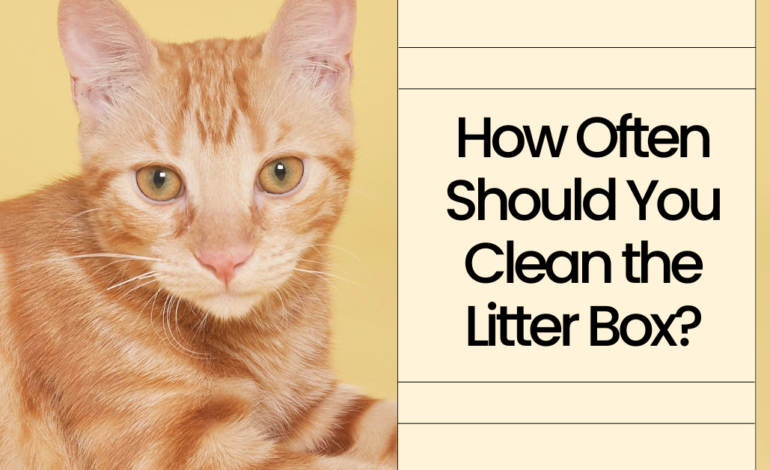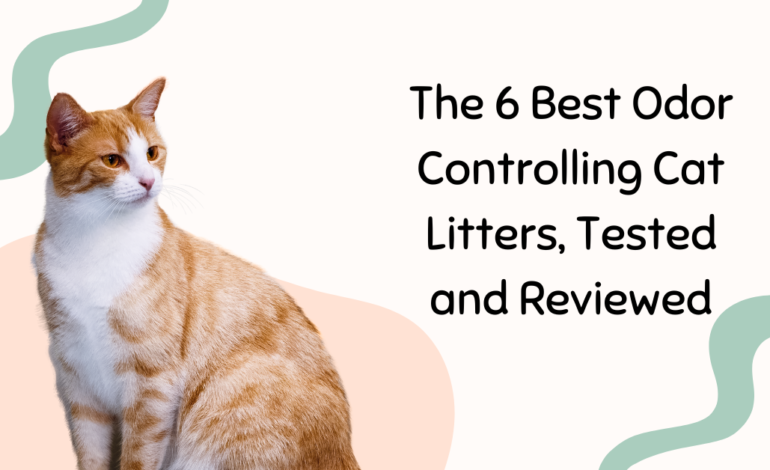How Often Should You Clean the Litter Box?
- By MeowCareHub
- March 7, 2025

A clean litter box is crucial for your cat’s health, hygiene, and all-around well-being. Cats are naturally clean animals, and an unclean litter box can foster bad odors, bacteria buildup, or even cause behavioral changes, like avoidance of the litter box altogether. Regular cleaning doesn’t just battle odors; it also prevents UTIs and other health concerns.
So just how often should you clean a litter box? It ranges from once a day to several… If you have a multi-cat home, then you could do more cleaning, whereas a low-dust, clumping litter could allow less cleaning.
In this guide, we break down how many times to clean a litter box, best practices for cleaning, and the possible risks of non-potty training an unclean litter box. Whether you’re a new cat owner or trying to embrace proper cat care, understanding how often cat litter should be cleaned is the key to keeping your feline pal happy-and your house smelling fresh.
🐾 Read on to learn the best ways to maintain a fresh, clean litter box for your cat!
How Often to Clean the Litter Box
A clean and odor-free litter box is a must have for the comfort and health of a cat.
So how often should a litter box be cleaned? The frequency varies, based on the type of litter being used, the number of cats, and how your house smells. General cleaning guidelines:
✔ Scoop waste twice a day – once in the morning and once in the evening. This will help prevent odor buildup and keep the litter box fresh.
✔ Fully change and clean the litter box: Every 1-2 weeks for non-clumping litter (it does not do a very good job of clumping waste together). Every 2-4 weeks for clumping litter (because the waste is systematically removed).
✔ If you have more than one cat using the same litter box. If the litter box smells even after the scooping. If your cat is avoiding doing his business in it. Regular cleaning means not only a clean kitty, but also one less chance of health problems, such as urinary tract infections or aversion to the litter box.
Sticking with the routine ensures a much happier coexistence for both you and your feline friend! 🐾
Does Litter Type Affect Cleaning Frequency?
Yes! Your selection of cat litter will greatly affect the frequency at which you will have to clean out the box. Some litters are good at controlling odor and waste management, while others might not control waste that well and require more frequent change-outs to keep up their freshness.
Clumping Litter
✅ Forms solid clumps around waste for easy removal
✅ Excellent odor control, trapping moisture and ammonia
✅ Scooping at least twice daily to remove clumps
✅ Replace and clean the entire litter box every 2-4 weeks
To buy Clumping Litters from Amazon Click Here.
Non-Clumping Litter
✅ Absorbs liquid but does not form clumps
✅ Less effective in odor control than clumping litter
✅ Needs to be scooped at least twice daily to remove solid waste
✅ Complete litter change and cleaning every 1-2 weeks
To buy Non- Clumping Litter from Amazon Click Here.
💡 Pro Tip:If the litter starts smelling or looking dirty before the scheduled cleaning time, change it sooner to keep your cat’s litter box fresh and sanitary.
Step-by-Step Guide to Cleaning a Litter Box
Cats are usually sensitive about their litter boxes. Keeping these places clean is essential for having a fresh-smelling house and for being healthy for a cat. Here is a guide to maintain odors under control and prevent buildup of bacteria.
Daily Maintenance: Quick & Easy Cleaning
✅Scoop out the solid waste and clumps of litter at least twice a day to prevent odor build-up.
✅ While you are doing this, check for litter depths and add in clean litter if below 2-3 inches.
✅ For any litter that sticks to sides, wipe the edges with a damp cloth.
Weekly or Biweekly Deep Cleaning: Full Litter Box Refresh
1️⃣ Empty the litter box completely, discarding all used litter.
2️⃣ Scrub the box using warm water and a mild soap (please avoid strong chemicals and ammonia-based cleaners).
3️⃣ Rinse well and leave the litter box dry completely before putting the litter back in.
4️⃣ Refill with fresh litter in compliance with the recommended depth of around 2-3 inches.
5️⃣ Place the litter box in the well-ventilated areas to prevent odors from lingering.
💡 Pro Tip: If your house has multiple cats, it is best to clean more frequently in order to avoid any extreme odors and build-up of bacteria. Regular deep-cleaning goes a long way in ensuring a healthy environment for both you and your cat! 🐾
How Many Litter Boxes Should You Have?
The golden rule: 1 litter box per cat, plus one extra.
| Number of Cats | Recommended Litter Boxes |
| 1 cat | 2 boxes |
| 2 cats | 3 boxes |
| 3 cats | 4 boxes |
Having enough litter boxes ensures that they stay cleaner for longer and prevents territorial disputes
Health Risks of a Dirty Litter Box
Poor litter box maintenance doesn’t merely create unwanted smells but can also pose serious health risks to your feline friend and the rest of the family. Here are a couple of possible hazards with a dirty litter box:
🐾 Bacterial & Parasite Infections
In a urine-soaked litter box, bacteria can multiply like crazy:
✅SalmoA Chair Food and Campylobacter: gastrointestinal troubles in both cats and humans.
✅Toxoplasmosis: an infection in the cat that can be very dangerous to pregnant women and to any person whose immune system has been compromised.
🌫️ Respiratory Issues
✅High levels of ammonia in the urine may cause bad odors, irritating your cats lungs. This can cause coughing and/or wheeze.
✅ Also, this can be precipitating an asthma episode or an allergy attack in any person nearby.
💧 Urinary Tract Infections (UTIs) & Kidney Issues
✅A dirty litter box may lead to cats not wanting to use it, thus increasing the time they hold their urine.
✅ All of this, in turn, would lead to UTI, bladder inflammation, and then kidney disease.
Why Regular Cleaning Matters
A clean and fresh cat litter box helps to:
✔Prevent health hazards for the cat and the family.
✔Lessen odor and improve indoor air quality.
✔Encourage proper use of the litter box so that the cat stays comfortable and free of stress.
To become a little more conscientious with regular cleaning of the cat litter box is a bonus for safety and hygiene at home! 🐾💙
How Litter Box Hygiene Affects Your Cat’s Behavior
Cats are generally said to be clean and inherently prefer fresh and odor-free surroundings. A filthy litter tray could cause them to become unhappy to the point of being detrimental to their conduct and health.
🚫 Refusing to Use the Litter Box
The litter box could make a cat:
✅Avoid using it altogether and, therefore, urinate and defecate anywhere in the house.
✅Hold the urine a touch too long and subject itself to possible urinary tract infections and kidney problems.
🚫 Eliminating Outside the Box
They should be eliminated from the:
✔Nice (Clean) Floor
✔Carpeting or area rugs
✔Neat furniture
✔Corners of the room on the floor or close to a window or a door
This is primarily due to a lack of comfort, and it can easily be dealt with through proper litter box care.
🚫 Increased Stress & Anxiety
Cats are habit-oriented creatures; alas, an unclean litter box will amplify the levels of stress in cats, consequently leading to:
✔ Over-grooming or licking (which is a common stress reaction).
✔ Aggression or irritation due to unease.
✔ Decreased appetite or hiding behaviors, indicating anxiety.
The Solution: Keep It Fresh & Clean!
Daily scooping and regular deep cleaning will:
✅ Guarantee that your cat will always find a clean and welcoming space.
✅ Lessen behavior problems arising from stress or discomfort.
✅ Help strengthen the bond with your cat by providing a clean and safe environment.
A clean litter box = a happy, healthy cat! 🐾💙
Are There Easier Ways to Maintain a Clean Litter Box?
Maintaining a fresh and odor-free litter box doesn’t have to be a hassle! Here are some convenient solutions which will make cleaning easier, while still ensuring proper hygiene for your cat.
✅ Self-Cleaning Litter Boxes
✔ Automatically scoop waste to lessen daily maintenance.
✔ The perfect solution for the pet parent that has no time, but still needs to be cleaned out completely every month.
✔ Some cats might require a little time to adapt to them because of the noise and movement.
✅ Litter Box Liners
✔ You can remove and replace litter easily with the use of plastic liners.
✔ They help in keeping waste from sticking to the bottom, hence less scrubbing.
✔ But some cats seem to dislike the texture and might either end up scratching or tearing the liner apart.
✅ High-Quality Litter
✔ Clumping litters that make clean-ups quicker and easier.
✔ Odor-control litters might be with activated charcoal or baking soda that help in keeping smells at bay.
✔ Less tracking and dust means your home has cleaner floors and air quality.
Conclusion
Keeping your cat’s litter box clean is required for its health, comfort, and hygiene. In other words, if you get rid of the litter box regularly, you can avoid odor, minimize chances of your feline friends getting ill, and make sure that your cat lives a happy and stress-free life. Make regular scooping of at least two times daily because that is the best way to keep the box from smelling. However, thorough cleaning of the box can be done every 1 to 4 weeks, depending on the litter type; this is to prevent bacteria growth. Include in your system better-quality odor-control methods: make clumping more efficient with premium litter, use self-cleaning litter boxes, and keep good ventilation. A clean and fixed litter box will encourage your cat to use it properly. This will not only leave your home odor-free but also create a more relaxing environment for your cat. Maintain a schedule for cleaning, as it’s the least you can do for your fur baby, and your cat would thank you with purrs and happy paws!
For more cat care tips, visit: Meow Care Hub! 🐾
FAQs
1. How often should you clean a litter box?
To keep the cat litter in impeccable condition, it is recommended to scoop out at least twice every day and deep clean every 1 to 4 weeks, depending on the type of litter used.
2. How should you clean a litter box with multiple cats?
More cats mean more waste! Cats should not have dirty litter boxes, therefore, scoop twice daily. Deep clean used clumping litter every 1-2 weeks, and non-clumping litter once a week.
3. What happens if you don’t clean the litter box often enough?
A litter box left uncleaned might cause problems like the following : Strong odors. Bacterial infections. Respiratory problems. Your cat refuses to use the litter box.
4. Can I use scented litter to reduce odor?
It is not advisable to use scented litter since they dislike a change in smell; instead, frequent scooping and regular cleaning of the box would help control odor.
5. What is the best way to clean a litter box?
Use mild soap and warm water; avoid ammonia-based cleaners and dry the box thoroughly before adding new litter.
6. How often should you clean your cat’s litter box if they are sick?
If your cat has certain medical issues – for instance, kidney disease or has diarrhea-you may have to clean the litter several times daily to prevent infections and discomfort.





